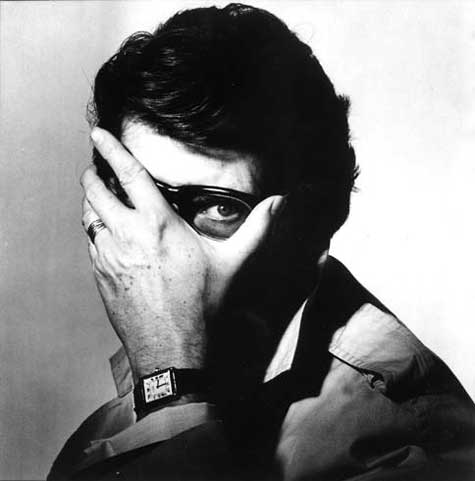-
Visualising Guitar Hero notecharts in pillars of fire. Daft, brilliant. I particularly like that it visualises the act of playing – the note chart itself, the keys pressed.
-
"That is the point that I am trying to make. The web is not, despite the desires of so many, a publishing medium. The web is a customer service medium. “Intense moderation” in a customer service medium is what “editing” was for publishing." Paul Ford is great.
-
"I have worked for an hour to create this sight, shedding the mistakes of my previous drafts as I go. But each ill-fated Meat Boy, each mistimed jump and buzz-saw victim, deserves to be here in the replay with me. Without each of them, my successful run would not exist. By collapsing my attempts into one moment, Super Meat Boy depicts not time wasted on failed runs, but experience gained as I slowly perfected my craft." Like I said, one of my games of the year, and this deftly explains why.
-
"No longer does the virtual simply enslave and deceive. Instead, it filters into the real—blurring any obvious, hierarchal distinction between the two worlds. The virtual in these films resembles more so the surreal life of our subconscious drives and desires, a mysterious source of power and revelation, than the programmed realm of illusion concocted by The Matrix. Perhaps we have come to spend more time on the computer than communicating face-to-face with other flesh-and-bone creatures, or smartphones have practically bent our bodies into question marks. But what I would argue has really shaped the virtual dimension in these films is the videogame, which has now come to nearly permeate our everyday imagination."
-
"No longer does the virtual simply enslave and deceive. Instead, it filters into the real—blurring any obvious, hierarchal distinction between the two worlds. The virtual in these films resembles more so the surreal life of our subconscious drives and desires, a mysterious source of power and revelation, than the programmed realm of illusion concocted by The Matrix. Perhaps we have come to spend more time on the computer than communicating face-to-face with other flesh-and-bone creatures, or smartphones have practically bent our bodies into question marks. But what I would argue has really shaped the virtual dimension in these films is the videogame, which has now come to nearly permeate our everyday imagination."
-
"Not least among these movements is larp, brought to its apotheosis in the Nordic countries, where vast, imaginative works of enormous artistic ambition receive attention not only from game geeks but from their national cultures as well. This vital phenomenon is now accessible to English speakers through this landmark work, an anthology of articles describing some of the most impressive and compelling works of the form. Anyone seriously interested in role-play, interactive narrative, and the collision between games and theater will find it of enormous interest." Greg's introduction sounds good, and the PDF sample made this book look really quite something.
Media from 2010
03 January 2011
In 2009, I kept a textfile in ~/Documents to track all the books I read. In previous years, I’d forgotten what I’d read, and didn’t want to lose track.
At the end of the year, I was disappointed in how tiny the list was. This was mainly in down to 2009 being a rubbish year (as years go). But still: for someone who loves books, it wasn’t enough.
This year, I repeated the exercise, but with a file called media-2010.txt. The goal was to track everything I consumed, whether or not I liked it or not. My thinking was simple: I wanted to read more, but by tracking movies, TV shows, exhibitions, and games, I hoped that I could at least see what I was doing when I wasn’t reading.
This isn’t the full list, but it’s the picks of it for this year.
Films
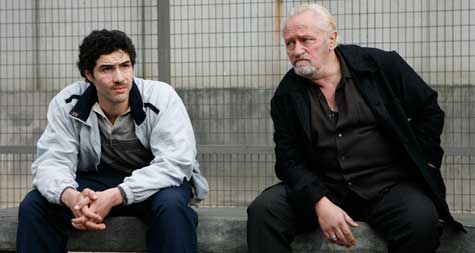
The best film I saw in 2010 was Jacques Audiard’s A Prophet. His The Beat That My Heart Skipped was already a firm favourite, so I was hugely enthusiastic for this, and really wasn’t disappointed. Superficially, it’s a prison drama, but there’s so much more going onto it than that, and it segues between life inside the prison, trips outside, and fantasy sequences with little fanfare. An early, pivotal scene of violence is brutal and truly unpleasant; it’s intended to stick with you throughout the movie, as it’s a hinge the plot sits upon. But outside that, violence is more a threat than a depiction, perhaps making the memory of that horrendous scene more notable.
It’s intense, nerve-wracking, and the promise of redemption dangled like a carrot in front of characters with many good reasons not to take it. Marvellous performances, wonderful moviemaking.
But: it really came out in 2009.
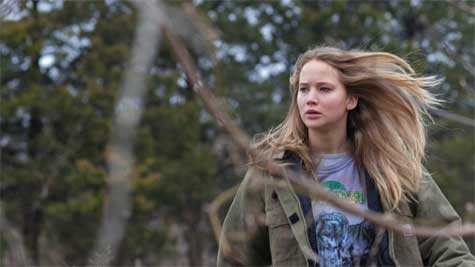
The best film I saw that was released in 2010 was Winter’s Bone; a cold slice of Ozarks-Noir. Which, of course, isn’t a genre, but the easiest way to describe this quest for a missing patriarch. Jennifer Lawrence’s performance is incredible, and I hope she’s rewarded. It’s not an easy movie by any means – the mountains are as much part of the scenery as they are written into the faces of much of the supporting cast – and you’ll never feel warm whilst watching it. It’s not a quest for redemption; just for survival. By the end of the film, it’s clear that all the characters are fighting to survive in their own ways. Great. (And: whilst Lawrence is the obvious stand-out, I loved John Hawkes’ nuanced performance as Teardrop).
I saw a lot, though, and enjoyed most things. I had a great time with Inception, primarily because I really like heist movies – put the team together, execute the job – and Nolan’s imaginative, clockwork plot played out as an excellent genre movie. It’s not necessarily clever, but it is intricate, and its execution is marvellous. Also, the suits are really good.
On the TV, I mainly enjoyed shows from America. The big discovery for me was Community, which is more inventive than many sitcoms I’ve seen a while. And I loved Rubicon for its intelligent take on intelligence work, even if it had a few too many plots for its own good, making its cancellation even more frustrating for fans. But what an actor’s show: Michael Cristofer’s Spangler is as devious as he is distracted, and Arliss Howard’s Ingram turned out to be exactly the sociopath you suspected he might be – an inventive sociopath, nontheless.
Books
Lots of alternate history this year.
Christopher Priest’s The Separation was a real stand-out – a tangly, bifurcated take on WWII, with two narratives of which only one can be true – though he refuses to commit to which. Twins, acting, impersonation, the negotiations of international politics; it’s a cracking read, and really shouldn’t have been buried on the SF shelf.
Similarly, Keith Roberts’ Pavane, a short-story sequence imagining England in the late 20th Century when ruled by a Holy Roman Empire was a real find. It’s a book heavily rooted in place: primarily around Dorset, Bournemouth, Dartmoor, that neck of the woods. In it, his characters enact a dance over fifty years – one that, initially, seems random, but structure eventually emerges. I also really liked the stuff about semaphore.
The biggest thing I read – spread throughout the year – was James Ellroy’s Underworld USA trilogy. The books stand alone well, if you don’t want to read the lot, and by the end, I think I can comfortably say that the very first (American Tabloid) is the best. They’re dense, knotted, slang-laden tales of politics and corruption, bad cops and good bagmen, surveillance and assassination, race and communism; the dark side of the sixties (and thus, the late fifties and early seventies – the lead-in and the results) explored through what might be true, might be history, might be a kind of alternate history. I was entranced, even when I squirmed through his machine-gun prose, the character’s casual racism (LA in the sixties as the black militant groups start to exert influence is not the most… sensitive setting), and the squicky violence. Though I like American Tabloid the first, Blood’s A Rover – 2009’s final installment – contains the clearest signs of redemption for many of the characters, and, in Don Crutchfield, one of Ellroy’s quietest protagonists.
Art
I think my favourite exhibitions of the year were the Irving Penn portraits at the NPG, and the Eadward Muybridge at Tate Britain.
The Penn was a lovely retrospective, showing an artist exploring portraiture and challenging its constraints. So much consistently inventive work throughout his career; so many brilliant portraits.
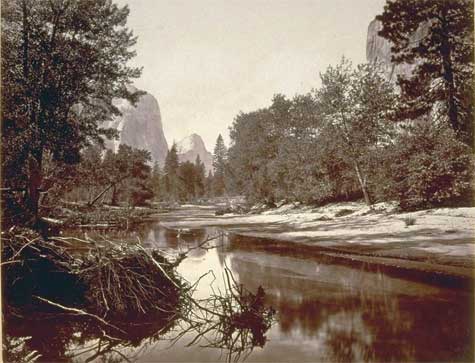
The Muybridge was a fascinating portrait of a man exploring photography itself. His time-and-motion images are rightly seminal, but what I wasn’t aware of was his landscape work – lugging huge photographic plates up the Californian hills, as an early landscape photographer. My favourite work in the exhibition were the gigantic, 360º panoramas of a pre-Earthquake San Francisco. An eccentric, then, but what an intrepid explorer of a nascent medium.
Oh, and special note to River Sounding at Somerset House; on a beautiful summer day, the thrumming, shaking bass of the Thames in its damp cellars was sensational.
Theatre
More trips to the theatre than in a long while, albeit still not many by the standard of the other sections of the list. One obvious stand out: The Old Vic’s revival of Tom Stoppard’s The Real Thing. Great to see this revived: in many ways, it’s one of his “straightest” plays, and manages to shift from a brilliant – if somehwat obvious opening – into a more thoughtful, considerate piece. It helped that Toby Stephens was utterly brilliant.
Music
One gig really stood out. Rival Schools at Hoxton Bar And Grill was a highlight. The post-hardcore group, almost on hiatus, return nine years after their first record with a second. And, with a falling star, comes a smaller venue: it sold out in an hour, was packed, and everybody knew the words to everything. And yet: so exciting to see such a polished, experience group of musicians still on top of the game, still playful – noodling around Beatles songs and metal covers between tracks – and playing to the audience perfectly.
And, of course, The Hold Steady in the summer played another of their great live sets: they’re fine enough on record, but are easily one of my favourite live acts: so much enthusiasm and energy, and, as ever, a ninety minute set with no duff moments.
Last.fm isn’t a representative example of what I enjoyed this year, strangely. Highlights from the CD stack: The Roots’ How I Got Over, the incredible My Beautiful Dark Twisted Fantasy, the Glasser and Warpaint albums, Scuba’s Triangulation, and many more besides.
My favourite moment in pop, though, was Nicki Minaj’s verse on Kanye’s Monster. For me, it’s one of the weaker tracks on MBDTF – until those ninety seconds, which are just something else. Seriously: best moment of the year.
Games

It’s hard to get away from Mass Effect 2, for me. My head tells me it’s exactly what I shouldn’t like – big, overarching, technical, lots of Up Front Story-Telling. It’s a bit too genre-heavy. And yet: my heart swelled as I played it. The gamer in me didn’t like the episodic structure, but the adult in me did: it played out like a series of Battlestar Galactica, broken near-perfectly into about 20-odd 45 minute chunks, advancing side-stories and main plot in turns. The shooting is now competent enough to not be hateful; the writing is great (when it’s not being a bit crap), and oh, the characters. Garrus, Thane, Legion, and especially Mordin; very strong. I know many people who didn’t get on with it, and I respect that: their problems were rarely mechanical, and usually about the universe, the characters, it not clicking. I think that’s OK – much better to dislike something because it’s not to your taste than because it’s entirely unlovable. Well done, Bioware.
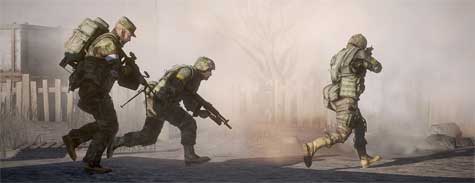
Battlefield: Bad Company 2, as well as being a total mouthful to say, was a surprise hit for me, and featured my favourite piece of gaming interface design last year: the way it utilises the back/select button. Public servers feature teamwork, almost no abuse, and very little voice chat, simply because of that button. It marks targets you’ve seen, and the little icon above them becomes visible for your whole team. As a result: everyone marks targets for everyone else. They get points for the mark, you get points for the kill, and so you mark targets for them. We don’t need to talk, or try to get people to play the team game, or argue with idiots, because we’ve got the back button. Couple that with the ability to respawn on squadmates, rather than way back at base, and BFBC2 works teamplay into its very mechanics without being complex or nerdy. The Vietnam expansion has brought people back, but the main game is still played to a high, social standard. The only team-game with public serves this good is TF2, in my tiny, humble opinion. And: the sound-design is phenomenal.
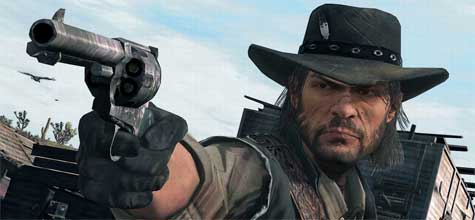
Red Dead Redemption was totally captivating for the twenty-or-so hours I explored its landscape, sidequests, and primary plot. It was lovely to see a genre so rarely explored in games done pretty well, although I do hope that some of the topics it explored – journey-as-narrative, most notably – can be explored without the brute force of a Rockstar budget and (alleged) Rockstar San Diego working practices.
Super Meat Boy is brilliant. Totally the sort of game my head likes. If you’ve not played it, you should. It’s got the tightest controls I’ve ever seen on a 360, brilliant level design, hilarious replays, and it manages to be the best kind of “old-school” fun. It’s nearly caused me to break a few controllers, but that’s part of the charm.
What else? Halo Reach, for starters. Halo is such an acquired taste, in my opinion; a real gamer’s game. After not caring much for 3, I ended up adoring Reach; a fine single-player campaign, tight, subtle multiplayer, and the rush that is Firefight. So much Firefight; so many grunts exploding in confetti. In some ways, it’s the top of the list – the most gamey-game I played this year. But it’s polish on something that was great to begin with, and not for everyone. If you’ve played it and liked it, you already know.
I didn’t play enough Super Street Fighter IV after giving so much time to the original, non-super variant last year. No matter; it’s not going away any time soon. And my unfinished pile is still high – right now, I’m enjoying Castlevania: Lords of Shadow and the majestic Need For Speed: Hot Pursuit, and they’re going to see me well into 2011.
That was a few things I liked in 2010; by no means all. Next year: more.
-
"In recent years we've seen plenty of criticism (including mine) leveled at video games that rehash old ideas; games that rely on genre formulas; games that ape the language of film. Games, we're often told, need new ideas. Games need to grow up. Games should leverage their defining interactivity. Cutscenes are lazy. Let movies be movies. Players want to write their own stories. Games don't need authored narratives. Games don't need linear stories. Games don't need stories. All games should be fun. No they shouldn't.
The problem with these reductive arguments is they fail to account for how art rails against boundaries; how artists inevitably seek to situate their work in the margins no one can own. Artists instinctively push back against "don't," "shouldn't," and "must." This is why we give them genius grants. It's also why we put them in prison. The real action is in the margins." Good stuff from Michael.
-
"It's true that Wyndham's preference is for no-nonsense, brisk, wry narrators, and the horrors that visit the books can seem like opportunities to show off good old British pluck. But the books are surprisingly unheroic, and often (notably in the cases of Kraken and Triffids) peculiarly open-ended. And if you look closely, you begin to see that there's something very uncosy, persistently unsettling, about these books, that continues to ask profound questions about the limits of our culture and the foundations of the post-war world."
-
"We’re happy to confirm the news today that the sale of the company is complete. We appreciate all of your support, comments and warm wishes in the preceding few weeks.
Viacom and MTV Networks have been an amazing home for us over the past 4 years. It’s where we launched both Rock Band and Dance Central, worked with The Beatles, Green Day, AC/DC, The Who and thousands of other artists. We want to take a moment to thank everyone in that organization who helped make these awesome games possible.
We’re excited to be returning to our roots as an independent and privately owned studio."
Brilliant news.
-
"Street Fighter is about everything games are about – all you’ve learned about positioning and strategy, every reaction tightened by every sudden twitch of your trigger fingers, every educated guess made at your opponent’s next move – all played out in a simple two-dimensional box where you test everything you’ve ever known about videogames. Street Fighter IV is the same old game of two-dimensional space control, strategy, and flat-out mind reading but it took whopping great polygons in an old-fashioned game to take a 2D fighter back to the masses." This is all true.
-
"To apply the same point to videogames, ‘we’ are exceptionally good at the analytic mode and extremely poor at the rhetorical persuasion. As a cohort, we’re remarkably analytical. There are not many writers, bloggers, critics, etc of videogames who are either committed to the persuasive communication of the veracity of their feelings, moods, and strange hunches about videogames, but there sure is a lot of people willing to point out the textual or dramaturgical features of XYZ latest game." This, many, many times over. It's one reason I tire of so much wordy criticism at the moment: it is exhaustive, but lacks direction. (This, for me, was the gap between my first years at university and my final year: finding the courage to make my own arguments, rather than just synthesizing everything around me).
-
Christian Nutt interviews Jesse Schell Lots of really interesting stuff in here – to be returned to, I think.
-
Nice list of restuarants and pubs. One of my favourite things about The Trip is turning out to be the food.
